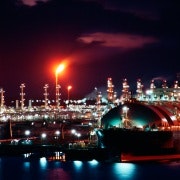US begins to flex its energy muscle
Reuters
The Obama administration gave the green light yesterday for exports of liquefied natural gas from a plant to be built in Oregon, the second such authorisation this year, as pressure intensifies on the White House to use the US energy bounty to respond to the political crisis in Ukraine.
It is unclear whether the approval of exports from Veresen Inc's Jordan Cove plant, the first LNG-export plant permitted on the US West Coast, was accelerated by political tension related to Russia's annexation of Ukraine's Crimea region.
The other LNG project to get the go-ahead on exports this year was approved by the Energy Department nearly six weeks ago. That's a gap between project approvals that's largely in line with the average interval of about eight weeks that has prevailed since Washington resumed issuing LNG export permits last summer.
The Jordan Cove approval did come faster than the 12-week interval between approvals of the previous project, Sempra's Cameron plant in Louisiana, and the one that preceded it.
A total of seven permits for sales to nonfree-trade agreement nations such as Japan and India have been issued, six of those in past 10 months.
The Jordan Cove project is set to deliver LNG to buyers in Asia, not Europe, where many lawmakers hope US LNG would undermine Moscow's influence in natural gas markets.
While the shipments from Jordan Cove would not be directed at Europe, analysts and industry groups said any gas exports from the United States could help increase flexibility in gas markets.
Undermine monopoly
In its authorisation of up to 0.8 billion cubic feet a day of gas exports from Jordan Cove, the Energy Department specifically argued that the US oil and gas boom has improved energy security in Europe and Asia by freeing up gas that would have been imported by United States.
The department said shipping US gas overseas could also help improve security for many US allies and trading partners.
Jordan Cove's application brings total US-approved LNG exports up to 9.27 bcf a day, once the plants are constructed and working at full capacity.
"The order clearly explains how the administration believes US LNG exports can lead to enhanced diversity of supply in global gas markets that would undermine the leverage of monopoly suppliers like Russia," said Jason Bordoff, director at the Center on Global Energy Policy at Columbia University.
The Jordan Cove project still needs approval from the Federal Energy Regulatory Commission before construction can begin, and could be several years away from actually shipping any LNG.
Lawmakers have called on the Obama administration to help US allies reduce dependence on Russian gas by speeding up the processing of more than two dozen applications seeking permission to ship US gas abroad.
Speaker of the House of Representatives John Boehner welcomed the latest approval, but said one approval does not signal that the administration is taking a new approach to its review.
"Many more long-delayed proposals to export US natural gas remain in limbo, and they must be approved if we're going to weaken Russia's dominance in many foreign energy markets," Boehner spokesman Brendan Buck said in a statement.
Jordan Cove's conditional export license comes ahead of several congressional hearings scheduled to examine the LNG export issue this week.
The House energy committee today will weigh a bill introduced by Colorado Republican Cory Gardner that would immediately approve export applications already filed with the Energy Department and mandate approval of future proposals of exports to World Trade Organisation members.
Currently only gas exports to countries with free trade agreements with the United States are automatically deemed to be in the public interest.
Originally published by Reuters. Reproduced with permission.
















